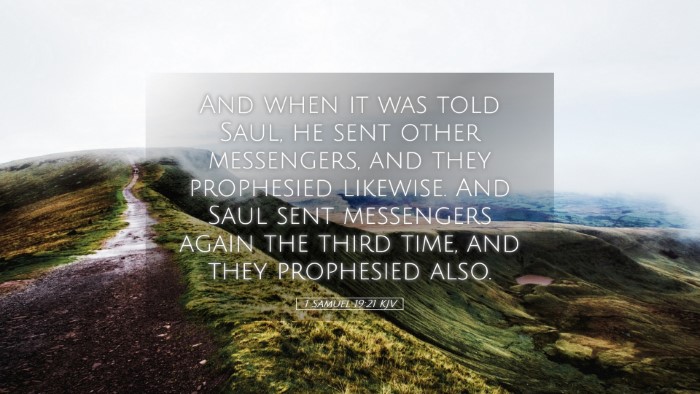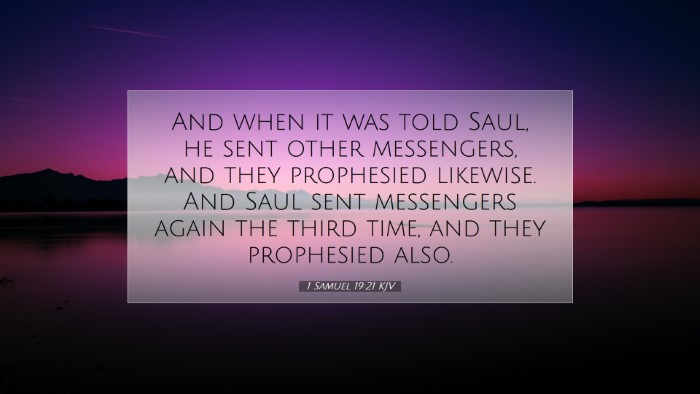Commentary on 1 Samuel 19:21
Bible Verse: "And when Saul had inquired of the LORD, he had answered him not, neither by dreams, nor by Urim, nor by prophets." - 1 Samuel 19:21
Introduction
This verse captures a pivotal moment in the narrative of King Saul's reign and sheds light on divine communication, the nature of authority, and the consequences of disobedience. The verse fits into the broader context of Saul's ongoing conflict with David and his struggles with spiritual and mental turmoil.
Contextual Analysis
This passage occurs in a time of turmoil in Israel. Saul is increasingly tormented by jealousy and anxiety regarding David's rise in popularity. The inquiry into the Lord, juxtaposed with His silence, highlights the spiritual disconnect between Saul and God, which is a recurring theme in the narrative.
Matthew Henry's Commentary
According to Matthew Henry, Saul's silence from God was a significant indicator of his spiritual state. Henry emphasizes that Saul had moved away from God's favor due to his disobedience and rejection of God’s commands.
- God’s Silence: Henry notes that God’s refusal to answer Saul was a form of judgment, illustrating that persistent sin can lead to divine silence.
- The Means of Communication: The mention of “dreams, Urim, nor prophets” indicates all avenues of divine communication had ceased for Saul. This marks a critical shift in Saul's relationship with God.
Albert Barnes' Commentary
Albert Barnes provides further depth to understanding Saul's inquiry. He suggests that Saul's question to the LORD was not sincere, as his heart was filled with bitterness towards David. His consultation with God was superficial and driven by desperation rather than genuine repentance.
- Desperation for Guidance: Barnes points out that Saul's inquiry exemplifies a heart in distress seeking answers, but lacking the commitment to rectify his transgressions.
- The Urim and Thummim: Barnes explains that the Urim and Thummim were sacred lots used by the high priest to discern the will of God. Saul’s inability to receive guidance through these means underscores the gravity of his estrangement from God.
Adam Clarke's Commentary
In Adam Clarke's views, the inquiry made by Saul illustrates a significant deviation from his earlier leadership instances. Clarke emphasizes that this moment signifies the loss of divine support in Saul’s life as he increasingly relied on his own judgment rather than God’s guidance.
- Spiritual Decline: Clarke notes that Saul’s inquiry about David only in a moment of crisis showcases a self-centered reliance on God when convenient, highlighting a critical spiritual decline.
- Prophetic Silence: The absence of prophetic voices during this time is a key sign of God's displeasure with Saul's leadership. Clarke suggests this absence is indicative of a broader disconnect within the nation of Israel.
Theological Insights
This verse serves as a profound reminder of the nature of divine communication and the consequences of a hardened heart. As demonstrated through Saul's experience, God desires a relationship marked by obedience rather than rituals or inquiries provided through distress.
- The Role of Obedience: The silence of God reflects the necessity of obedience for spiritual clarity and understanding. A life lived contrary to God's commands will ultimately yield confusion and a lack of guidance.
- Desperation and Authenticity: The inquiry made by Saul exhibits a crucial truth about seeking God’s guidance only in times of need rather than in consistent relationship and worship. This teaches that authenticity in our approach to God is paramount.
- The Sovereignty of God: The void of prophetic voice signifies God's sovereignty in choosing when and how to communicate with His people. His silence is as significant as His answers, reflecting His moral governance over Israel.
Conclusion
1 Samuel 19:21 serves as a poignant reflection on the consequences of spiritual estrangement, the necessity of sincere faith, and the implications of divine silence. The insights from the commentaries encourage believers to cultivate a consistent relationship with God that values obedience and authenticity in seeking His face. As pastors, students, and scholars study this passage, they are reminded of the importance of keeping a heart aligned with God’s will to receive His guidance and wisdom.


